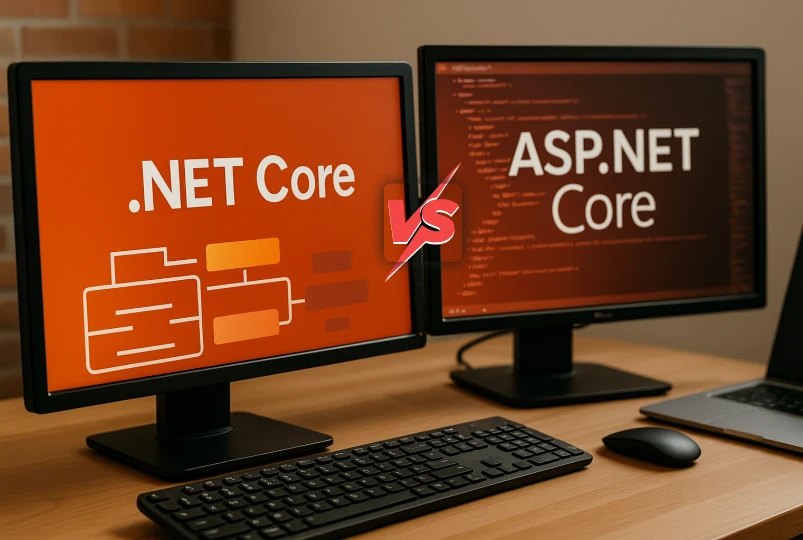In 2025, the demand for modern, high-performing web and app frameworks is higher than ever. Yet one question still confuses many teams: .NET Core vs ASP.NET Core, are they the same, or completely different?
Both frameworks are part of Microsoft’s development ecosystem, but they serve different purposes. The confusion can lead to poor technical choices, wasted development hours, or unnecessary complexity.
Here’s why this comparison matters now:
- Teams are modernizing legacy apps or starting greenfield builds
- Performance, scalability, and cross-platform compatibility are top priorities
- Choosing the right tech stack impacts speed, cost, and long-term maintenance
In this blog, we’ll break down the differences between .NET Core and ASP.NET Core in simple terms. You’ll learn:
- What each framework is really built for
- Key differences that affect real-world development
- How to decide which is best for your project
If you’re looking for the right expertise, Webvillee is a trusted .NET Core development company ready to guide you through every step.
What Is .NET Core?
.NET Core is an open-source, cross-platform framework developed by Microsoft. It allows developers to build applications that run on Windows, macOS, and Linux without being locked into a single environment.
At its core, .NET Core provides the foundation for building:
- Console applications
- Web APIs
- Microservices
- Cloud-native applications
This flexibility makes it a solid choice for businesses aiming to build high-performance, scalable solutions that work across different platforms.
Key Features of .NET Core:
- Cross-platform support
- High-speed performance and minimal overhead
- Modular architecture with lightweight deployments
- Support for modern development tools like Docker and Kubernetes
- Backed by a large developer community and regular updates
In a modern development stack, .NET Core often powers the business logic, handles background tasks, and forms the base of service-driven architecture.
If your project needs cross-platform capabilities, low-latency APIs, or microservices, net core development can be a smart path forward. It is fast, adaptable, and ready for long-term growth.

What Is ASP.NET Core?
ASP.NET Core is a web development framework built on top of .NET Core. While .NET Core is the underlying platform, ASP.NET Core is the layer that enables developers to create dynamic web apps, APIs, and cloud-based services.
It is fast, modular, and designed to support modern development practices.
What You Can Build with ASP.NET Core:
- Responsive web applications
- RESTful APIs
- Real-time apps using SignalR
- Microservices and container-based deployments
- Cloud-native solutions on platforms like Azure and AWS
ASP.NET Core combines the best of MVC (Model-View-Controller), Razor Pages, and Web API into one unified framework. It also supports dependency injection, middleware pipelines, and built-in authentication systems.
Key Features:
- Cross-platform support (Windows, Linux, macOS)
- High performance for web and API workloads
- Asynchronous programming with minimal resource usage
- Built-in security features like authentication, authorization, and HTTPS enforcement
For businesses seeking flexibility and scale, working with an experienced asp net core development company ensures that your applications are built to modern standards while being easy to maintain and upgrade.
.NET Core vs ASP.NET Core: Core Differences
If you are building a new application in 2025, understanding the difference between .NET Core vs ASP.NET Core is crucial for making the right architectural decision.
Though the names sound similar, they serve different purposes within the .NET ecosystem.
Here’s a simple breakdown to make the distinction easier:
.NET Core
- A general-purpose development platform
- Used to build console apps, desktop apps, microservices, and more
- Suitable for back-end logic, utilities, and cross-platform tools
ASP.NET Core
- A web development framework built on .NET Core
- Used for web apps, APIs, real-time communication, and cloud services
- Adds features like MVC, Razor Pages, and SignalR
Key Differences at a Glance:
| Feature | .NET Core | ASP.NET Core |
|---|---|---|
| Purpose | Backend/runtime platform | Web framework on top of .NET Core |
| Used For | Desktop, console, microservices | Web apps, APIs, cloud-native applications |
| Built-In Web Support | No | Yes |
| Performance Optimization | General | Tuned for high-performance web workloads |
Understanding these differences will help you choose the right foundation based on your project goals, whether it’s a data-heavy tool or a client-facing portal.

Choosing the Right Framework for Your Project
Deciding between .NET Core vs ASP.NET Core starts with one basic question: what exactly are you trying to build?
Each framework serves a different purpose, and the right fit depends on your project’s scope and functionality.
Here are a few practical questions to help you decide:
- Are you building a web app, API, or cloud service?
→ ASP.NET Core is your go-to. - Do you need to build a cross-platform console app or microservice?
→ Choose .NET Core. - Are MVC patterns, Razor Pages, or SignalR part of your architecture?
→ ASP.NET Core supports all of these out of the box. - Do you plan to integrate with existing Windows-based systems?
→ Evaluate whether cross-platform support is essential.
Tips for making the right call in 2025:
- Do not choose based on trends. Choose based on fit.
- Understand the ecosystem each framework supports.
- Consider long-term maintenance and scalability.
At Webvillee, our Dot Net Development experts guide businesses through this decision with clarity, ensuring your tech stack supports your goals, not complicates them.
How Webvillee Guides the Right .NET Stack for You
Choosing between .NET Core vs ASP.NET Core is not just a technical call, it’s a strategic one. At Webvillee, we help you make that decision with full clarity.
Our team has delivered solutions using both frameworks for clients across industries. For instance:
- A logistics dashboard built on ASP.NET Core for seamless web performance
- A cloud-native inventory management tool using .NET Core for cross-platform scalability
We analyze your business goals, app complexity, and long-term plans before recommending the stack that fits best. Whether you need rich web interfaces or background services, we map the right path for you.
Our custom software development service ensures the stack supports your unique needs, not the other way around.
Have a project in mind? Get In Touch with us today and let’s build it the right way from the start.

